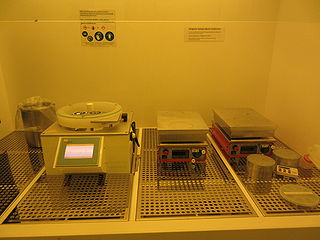Specific Process Knowledge/Lithography/Baking: Difference between revisions
No edit summary |
|||
| (218 intermediate revisions by 5 users not shown) | |||
| Line 1: | Line 1: | ||
'''Feedback to this page''': '''[mailto: | {{cc-nanolab}} | ||
'''Feedback to this page''': '''[mailto:labadviser@nanolab.dtu.dk?Subject=Feed%20back%20from%20page%20http://labadviser.nanolab.dtu.dk/index.php?title=Specific_Process_Knowledge/Lithography/Baking click here]''' | |||
[[Category: Equipment|baking]] | |||
[[Category: Lithography|Baking]] | |||
__TOC__ | |||
=Comparing baking methods= | |||
{|border="1" cellspacing="1" cellpadding="10" style="text-align:left;" | |||
|- | |||
|- | |||
|-style="background:silver; color:black" | |||
! | |||
![[Specific_Process_Knowledge/Lithography/Baking#Small benchtop hotplates|Spray coater hotplate]] | |||
![[Specific_Process_Knowledge/Lithography/Baking#SU-8 hotplates 1, 2 & 3| SU-8 hotplates 1, 2 & 3]] | |||
![[Specific Process Knowledge/Lithography/Baking#Small_benchtop_hotplates|Small benchtop hotplates]] | |||
![[Specific Process Knowledge/Lithography/Baking#Gamma_hotplates|Gamma hotplates]] | |||
![[Specific_Process_Knowledge/Lithography/Baking#Oven: 110C - 250C|Oven: 110C - 250C]] | |||
![[Specific Process Knowledge/Lithography/Baking#Oven_250C|Oven 250C]] | |||
|- | |||
|- | |||
|-style="background:WhiteSmoke; color:black" | |||
!Purpose | |||
| | |||
Adjustable temperature, contact bake | |||
*Soft bake | |||
*PEB | |||
*Hard bake | |||
| | |||
Programmable, ramped contact bake | |||
*Soft bake of SU-8 | |||
*PEB of SU-8 | |||
| | |||
Hotplate: 90-110C:<br /> | |||
Programmable, contact bake | |||
*Soft bake | |||
*PEB | |||
Labspin hotplates:<br /> | |||
Adjustable temperature, contact bake | |||
*Soft bake | |||
*PEB | |||
*Hard bake | |||
| | |||
Recipe dependent temperature, contact or proximity bake | |||
*Soft bake | |||
*PEB | |||
*Hard bake | |||
| | |||
Manual convection bake | |||
*Hard bake | |||
*Post-exposure bake | |||
| | |||
Manual convection bake | |||
*Dehydration | |||
*'''NO resist!''' | |||
|- | |||
|- | |||
|-style="background:LightGrey; color:black" | |||
!Temperature | |||
| | |||
Maximum 180°C | |||
Temperature with top-plate: Actual surface temperature = 0.9 * display value | |||
| | |||
Maximum 110°C | |||
| | |||
Hotplate: 90-110C:<br /> | |||
*Maximum 120°C | |||
*Return to 90°C after use | |||
Labspin hotplates:<br /> | |||
*Maximum temperature is hotplate dependent | |||
*Temperature with top-plate: Actual surface temperature = 0.9 * display value | |||
| | |||
Fixed at various recipe dependent temperatures | |||
| | |||
110 - 250°C | |||
Return to 110°C after use | |||
| | |||
Fixed at 250°C | |||
|- | |||
|- | |||
|-style="background:WhiteSmoke; color:black" | |||
!Substrate size | |||
| | |||
* Pieces | |||
* 50 mm wafer | |||
* 100 mm wafer | |||
* 150 mm wafer | |||
* 200 mm wafer | |||
| | |||
* pieces | |||
* 50 mm wafers | |||
* 100 mm wafers | |||
* 150 mm wafer | |||
* 200 mm wafer | |||
| | |||
* pieces (only Labspin hotplates) | |||
* 50 mm wafers | |||
* 100 mm wafers | |||
* 150 mm wafer | |||
* 200 mm wafer | |||
| | |||
* 100 mm wafers | |||
* 150 mm wafers | |||
| | |||
* 100 mm wafers | |||
* 150 mm wafers | |||
| | |||
* 100 mm wafers | |||
* 150 mm wafers | |||
|- | |||
|-style="background:LightGrey; color:black" | |||
!Allowed materials | |||
| | |||
All substrates | |||
Film or pattern of all types | |||
| | |||
Silicon, glass, and polymer substrates | |||
Film or pattern of all types except type IV | |||
| | |||
Hotplate dependent. | |||
(All substrates and film or pattern of all types, unless otherwise noted on the hotplate) | |||
| | |||
Silicon and glass substrates | |||
| | |||
Silicon, glass, and high Tg polymer substrates | |||
Film or pattern of all types | |||
| | |||
Silicon, glass, and high Tg polymer substrates | |||
Film or pattern of all types except resist| | |||
|- | |||
|-style="background:WhiteSmoke; color:black" | |||
!Restrictions <br> (Not allowed) | |||
| | |||
|III-V, copper, steel substrates | |||
Pb, Te films | |||
| | |||
Hotplate dependent. Any restrictions will be noted on the hotplate. | |||
| | |||
|III-V, low Tg polymer, copper, steel substrates | |||
|III-V, low Tg polymer, copper, steel substrates | |||
Resist is not allowed | |||
|- | |||
|-style="background:WhiteSmoke; color:black" | |||
|- valign="top" | |||
!QC<br>'''- requires login''' | |||
| | |||
https://labmanager.dtu.dk/view_binary.php?type=data&mach=293 | |||
| | |||
Hotplate 1:<br /> https://labmanager.dtu.dk/view_binary.php?type=data&mach=122 | |||
Hotplate 2:<br /> https://labmanager.dtu.dk/view_binary.php?type=data&mach=124 | |||
Hotplate 3:<br /> https://labmanager.dtu.dk/view_binary.php?type=data&mach=453 | |||
| | |||
Hotplate: 90-110C:<br /> https://labmanager.dtu.dk/view_binary.php?type=data&mach=336 | |||
Spin coater: Labspin 02:<br />https://labmanager.dtu.dk/view_binary.php?type=data&mach=362 | |||
Spin coater: Labspin 03:<br />https://labmanager.dtu.dk/view_binary.php?type=data&mach=387 | |||
| | |||
Spincoater: Gamma ebeam & UV:<br /> http://labmanager.dtu.dk/view_binary.php?fileId=4431 | |||
Spincoater: Gamma UV:<br /> http://labmanager.dtu.dk/view_binary.php?fileId=4432 | |||
Developer: TMAH UV-lithography:<br /> http://labmanager.dtu.dk/view_binary.php?fileId=4434 | |||
Spincoater: Süss stepper:<br /> http://labmanager.dtu.dk/view_binary.php?fileId=4433 | |||
Developer: Stepper:<br /> http://labmanager.dtu.dk/view_binary.php?fileId=4435 | |||
| | |||
| | |||
|- | |||
|} | |||
<br clear="all" /> | <br clear="all" /> | ||
= | = Hotplates = | ||
==Hotplate: 90-110C== | ==Hotplate: 90-110C== | ||
[[Image: | [[Image:Hotplate90-110C in C-1.jpg|300x300px|thumb|Hotplate: 90-110C located in C-1]] | ||
Hotplate: 90-110C is used for baking of 2" - 6" wafers. | Hotplate: 90-110C is used for baking of 2" - 6" wafers. Do not exceed 120°C. | ||
The user manual, and contact information can be found in LabManager: | |||
[http://labmanager.danchip.dtu.dk/function.php?module=Machine&view=view&mach=336 Hotplate: 90-110C] - '''requires login''' | |||
<br clear="all" /> | <br clear="all" /> | ||
== | ==SU-8 hotplates 1, 2 & 3== | ||
[[Image:SU-8hotplates.jpg|300x300px|thumb|Hotplate 1 (SU8) and Hotplate 2 (SU8) situated in C-1]] | [[Image:SU-8hotplates.jpg|300x300px|thumb|Hotplate 1 (SU8) and Hotplate 2 (SU8) situated in C-1]] | ||
We have | We have three dedicated SU-8 hotplates in C-1 and E-4. | ||
Users can control the ramp-time, the baking temperature, and the baking time. | Users can control the ramp-time, the baking temperature, and the baking time. | ||
In order to avoid thermal curing of SU-8 residues on the hotplates, they are temperature limited to 180°C. | |||
The user manual, and contact information can be found in LabManager: | |||
[http://labmanager.danchip.dtu.dk/function.php?module=Machine&view=view&mach=122 Hotplate 1 (SU8)] - '''requires login''' | |||
[http://labmanager.danchip.dtu.dk/function.php?module=Machine&view=view&mach=124 Hotplate 2 (SU8)] - '''requires login''' | |||
[http://labmanager.danchip.dtu.dk/function.php?module=Machine&view=view&mach=453 Hotplate 3 (SU8)] - '''requires login''' | |||
<br clear="all" /> | <br clear="all" /> | ||
= | ==Small benchtop hotplates== | ||
Model: Präzitherm PZ 28-2. | |||
Contact bake only. Maximum temperature is hotplate dependent. | |||
Most of these hotplates have been fitted with a top-plate in order to protect the original hotplate surface. With the top-plate, the set point of the controller must be adjusted in order to achieve the correct temperature during the bake: | |||
'''Actual surface temperature = 0.9 * display value''' | |||
<div align="right"> | |||
<gallery widths="320px" heights="240px"> | |||
File:Benchtop C1.jpg|Benchtop hotplate for Spray coater located in C-1 | |||
File:Labspin_2.JPG|Benchtop hotplates for Labspins in E-5 | |||
</gallery> | |||
</div> | |||
<br clear="all" /> | <br clear="all" /> | ||
== | ==Gamma hotplates== | ||
[[Image: | [[Image:HMDS gammaUV.jpg|300x300px|thumb|Hotplate modules in Spin Coater: Gamma UV.]] | ||
Hotplate temperatures are recipe dependent. | |||
'''Information about the Süss MicroTec Gamma tools can be found in labadviser:''' | |||
*[http://labadviser.danchip.dtu.dk/index.php/Specific_Process_Knowledge/Lithography/Coaters#Spin_Coater:_Gamma_UV Spin Coater: Gamma UV] | |||
*[http://labadviser.danchip.dtu.dk/index.php/Specific_Process_Knowledge/Lithography/Coaters#Spin_Coater:_Gamma_E-beam_and_UV Spin Coater: Gamma e-beam & UV] | |||
*[http://labadviser.danchip.dtu.dk/index.php/Specific_Process_Knowledge/Lithography/Development#Developer_TMAH_UV-lithography Developer TMAH UV-lithography] | |||
*[http://labadviser.danchip.dtu.dk/index.php/Specific_Process_Knowledge/Lithography/DUVStepperLithography#S.C3.9CSS_Spinner-Stepper Spin Coater: Süss Stepper] | |||
*[http://labadviser.danchip.dtu.dk/index.php/Specific_Process_Knowledge/Lithography/DUVStepperLithography#Developer_TMAH_Stepper Developer: TMAH Stepper] | |||
<br clear="all" /> | <br clear="all" /> | ||
== | = Ovens = | ||
[[Image: | |||
==Oven: 110C - 250C== | |||
[[Image:Oven120C-250C in C-1.jpg|300x300px|thumb|Oven: 110C - 250C situated in C-1]] | |||
Variable temperature convection oven mostly used for baking of wafers as a hard baking step after development of photoresist. | |||
The set-point can be varied, but should always be returned to 110°C after use. | |||
The user manual, and contact information can be found in LabManager: | |||
[http://labmanager.danchip.dtu.dk/function.php?module=Machine&view=view&mach=119 Oven: 110C - 250C] - '''requires login''' | |||
<br clear="all" /> | <br clear="all" /> | ||
{{:Specific Process Knowledge/Lithography/Pretreatment/Oven_250C}} | |||
Latest revision as of 13:50, 10 May 2023
The contents on this page, including all images and pictures, was created by DTU Nanolab staff unless otherwise stated.
Feedback to this page: click here
Comparing baking methods
| Spray coater hotplate | SU-8 hotplates 1, 2 & 3 | Small benchtop hotplates | Gamma hotplates | Oven: 110C - 250C | Oven 250C | |
|---|---|---|---|---|---|---|
| Purpose |
Adjustable temperature, contact bake
|
Programmable, ramped contact bake
|
Hotplate: 90-110C:
|
Recipe dependent temperature, contact or proximity bake
|
Manual convection bake
|
Manual convection bake
|
| Temperature |
Maximum 180°C Temperature with top-plate: Actual surface temperature = 0.9 * display value |
Maximum 110°C |
Hotplate: 90-110C:
|
Fixed at various recipe dependent temperatures |
110 - 250°C Return to 110°C after use |
Fixed at 250°C |
| Substrate size |
|
|
|
|
|
|
| Allowed materials |
All substrates Film or pattern of all types |
Silicon, glass, and polymer substrates Film or pattern of all types except type IV |
Hotplate dependent. (All substrates and film or pattern of all types, unless otherwise noted on the hotplate) |
Silicon and glass substrates |
Silicon, glass, and high Tg polymer substrates Film or pattern of all types |
Silicon, glass, and high Tg polymer substrates Film or pattern of all types except resist| |
| Restrictions (Not allowed) |
III-V, copper, steel substrates
Pb, Te films |
Hotplate dependent. Any restrictions will be noted on the hotplate. |
III-V, low Tg polymer, copper, steel substrates | III-V, low Tg polymer, copper, steel substrates
Resist is not allowed | ||
| QC - requires login |
https://labmanager.dtu.dk/view_binary.php?type=data&mach=293 |
Hotplate 1: Hotplate 2: Hotplate 3: |
Hotplate: 90-110C: Spin coater: Labspin 02: Spin coater: Labspin 03: |
Spincoater: Gamma ebeam & UV: Spincoater: Gamma UV: Developer: TMAH UV-lithography: Spincoater: Süss stepper: Developer: Stepper:
|
Hotplates
Hotplate: 90-110C
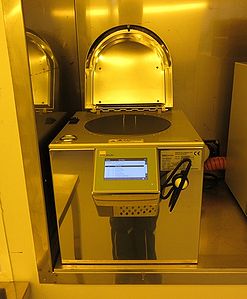
Hotplate: 90-110C is used for baking of 2" - 6" wafers. Do not exceed 120°C.
The user manual, and contact information can be found in LabManager:
Hotplate: 90-110C - requires login
SU-8 hotplates 1, 2 & 3
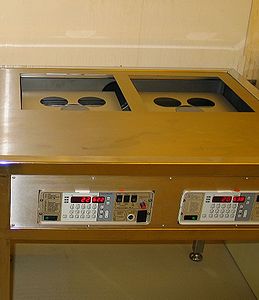
We have three dedicated SU-8 hotplates in C-1 and E-4.
Users can control the ramp-time, the baking temperature, and the baking time. In order to avoid thermal curing of SU-8 residues on the hotplates, they are temperature limited to 180°C.
The user manual, and contact information can be found in LabManager:
Hotplate 1 (SU8) - requires login
Hotplate 2 (SU8) - requires login
Hotplate 3 (SU8) - requires login
Small benchtop hotplates
Model: Präzitherm PZ 28-2.
Contact bake only. Maximum temperature is hotplate dependent.
Most of these hotplates have been fitted with a top-plate in order to protect the original hotplate surface. With the top-plate, the set point of the controller must be adjusted in order to achieve the correct temperature during the bake:
Actual surface temperature = 0.9 * display value
Gamma hotplates
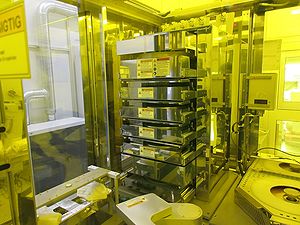
Hotplate temperatures are recipe dependent.
Information about the Süss MicroTec Gamma tools can be found in labadviser:
- Spin Coater: Gamma UV
- Spin Coater: Gamma e-beam & UV
- Developer TMAH UV-lithography
- Spin Coater: Süss Stepper
- Developer: TMAH Stepper
Ovens
Oven: 110C - 250C
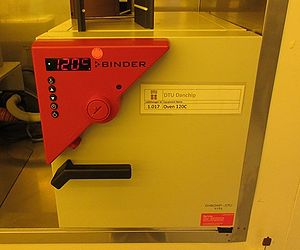
Variable temperature convection oven mostly used for baking of wafers as a hard baking step after development of photoresist.
The set-point can be varied, but should always be returned to 110°C after use.
The user manual, and contact information can be found in LabManager:
Oven: 110C - 250C - requires login
Oven 250C
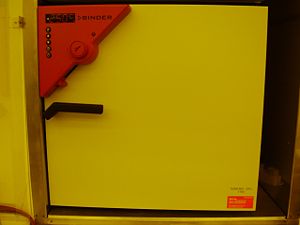
The oven is typically used for dehydration pretreatment, of Si and glass substrates, to promote the resist adhesion. We recommend placing the wafers in a metal carrier in the oven for at least for 4 hours, or overnight, and spin coat resist on them as soon as possible after removing them from the oven.
The user manual, and contact information can be found in LabManager:
Oven 250C - requires login


